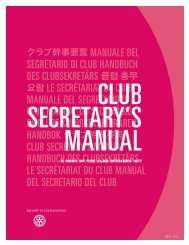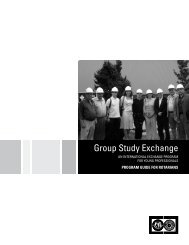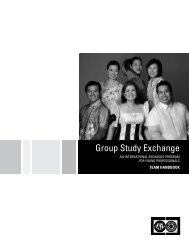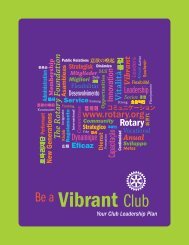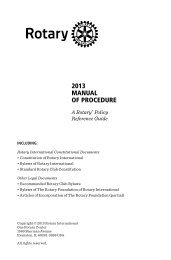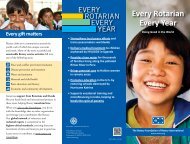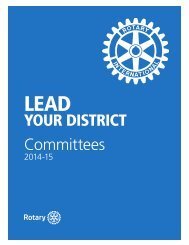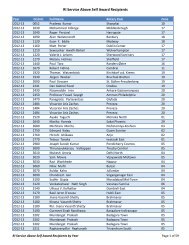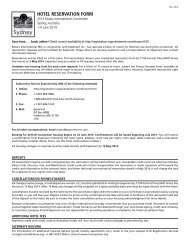La conférence de district [800-FR] - Rotary International
La conférence de district [800-FR] - Rotary International
La conférence de district [800-FR] - Rotary International
You also want an ePaper? Increase the reach of your titles
YUMPU automatically turns print PDFs into web optimized ePapers that Google loves.
<strong>district</strong><br />
conference<br />
M A N U A L<br />
1 Planning Your Conference<br />
Purpose 1<br />
Gui<strong>de</strong>lines 1<br />
Roles and Responsibilities 2<br />
Participants 5<br />
Logistics 6<br />
Risk Management 8<br />
Needs Assessment 9<br />
Program 9<br />
Program Agenda Topics 10<br />
District Lea<strong>de</strong>rship Seminar 12<br />
Resources 12<br />
2 Conducting Conference Business<br />
District Elections 13<br />
Voting 14<br />
Actions of a District Conference 16<br />
3 Promoting Your Conference<br />
Rotarians 19<br />
Media 20<br />
Resources 20<br />
<strong>800</strong>-EN—(711)
1 Planning Your Conference<br />
The District Conference Manual is <strong>de</strong>signed to help <strong>district</strong> conference committees plan an<br />
event that meets the gui<strong>de</strong>lines established by the <strong>Rotary</strong> <strong>International</strong> Board of Directors<br />
and the RI Constitution and Bylaws. The gui<strong>de</strong>lines presented in this manual should be<br />
adapted to suit the needs, traditions, and customs of your <strong>district</strong>.<br />
Use www.rotary.org as your main resource when planning your <strong>district</strong> conference.<br />
Here you can access current information on all aspects of <strong>Rotary</strong>, including program<br />
<strong>de</strong>tails, news, and announcements, and you can shop and search for resources, log<br />
into Member Access, and contact staff at RI World Headquarters.<br />
Purpose<br />
The purpose of the <strong>district</strong> conference is to provi<strong>de</strong> opportunities for networking, inspirational<br />
addresses, and discussions of <strong>Rotary</strong>-related matters. The event should recognize<br />
the service programs, projects, and public relations achievements in the <strong>district</strong> in or<strong>de</strong>r<br />
to inspire Rotarians to become more involved in service. The conference should also give<br />
Rotarians and clubs a vision of <strong>Rotary</strong> beyond the club level and provi<strong>de</strong> a memorable<br />
fellowship experience. Many Rotarians have said that they were never truly enthusiastic<br />
about <strong>Rotary</strong> until they saw an inspirational presentation at a <strong>district</strong> conference.<br />
Gui<strong>de</strong>lines<br />
At a minimum, your <strong>district</strong> conference program/itinerary should address the following:<br />
• Schedule the RI presi<strong>de</strong>nt’s representative’s two conference addresses and the brief<br />
remarks at the end of the conference.<br />
• Discuss and adopt the audited financial statement from the previous <strong>Rotary</strong> year.<br />
• Approve the <strong>district</strong> levy, if it was not approved at the <strong>district</strong> assembly or presi<strong>de</strong>ntselect<br />
training seminar.<br />
• Elect the <strong>district</strong>’s representative to the Council on Legislation, during the <strong>Rotary</strong> year<br />
two years before the Council meets, if the <strong>district</strong> chooses not to use the nominating<br />
committee procedure.<br />
• Elect the member of the nominating committee for the RI Board of Directors, as appropriate<br />
for your zone.<br />
District Conference Manual 1
These additional gui<strong>de</strong>lines can help you ensure your conference is successful:<br />
• Schedule the conference for two to three days to inclu<strong>de</strong> plenary sessions and group<br />
discussion on <strong>Rotary</strong> and <strong>Rotary</strong> Foundation topics.<br />
• Avoid scheduling conflicts with the <strong>district</strong> assembly, the <strong>International</strong> Assembly,<br />
<strong>Rotary</strong> institute, RI Convention, and public holidays.<br />
• Hold your conference with another <strong>district</strong>.<br />
• Plan a program that will be interesting to <strong>district</strong> Rotarians.<br />
• Involve the RI presi<strong>de</strong>nt’s representative in group discussions and other sessions.<br />
• Schedule spouse activities and other events at times that don’t conflict with plenary<br />
sessions.<br />
• Recognize and welcome new Rotarians, first-time conference atten<strong>de</strong>es, club presi<strong>de</strong>nts,<br />
and incoming club officers.<br />
• Inclu<strong>de</strong> those who have participated in <strong>Rotary</strong> and <strong>Rotary</strong> Foundation activities.<br />
• Consi<strong>de</strong>r <strong>district</strong> resolutions.<br />
• Promote club and <strong>district</strong> projects.<br />
• Provi<strong>de</strong> a new member orientation event.<br />
• Offer a <strong>district</strong> lea<strong>de</strong>rship seminar immediately before or after the conference for interested<br />
Rotarians who have served as club presi<strong>de</strong>nt or held a club lea<strong>de</strong>rship role for at<br />
least three years.<br />
• Keep costs low.<br />
• Publicize next year’s conference, and encourage preregistration.<br />
Roles and Responsibilities<br />
Organizing a <strong>district</strong> conference requires the efforts of many Rotarians throughout the<br />
<strong>district</strong>, who must work together to implement the governor’s vision for the event.<br />
District Governor<br />
The <strong>district</strong> governor presi<strong>de</strong>s over the conference. By ensuring that the event highlights<br />
the many service opportunities available through <strong>Rotary</strong> and the Foundation, the governor<br />
helps motivate individual Rotarians to become involved in <strong>Rotary</strong> beyond the club<br />
level. Before the conference, the governor should take every opportunity to promote the<br />
conference among <strong>district</strong> Rotarians. Some of these responsibilities may take place before<br />
the start of your year.<br />
District governor responsibilities:<br />
• Appoint the chair and members of the <strong>district</strong> conference committee while serving as<br />
governor-elect.<br />
• Visit other <strong>district</strong> conferences as governor-elect to get i<strong>de</strong>as.<br />
• Appoint a conference secretary in consultation with the host club’s presi<strong>de</strong>nt.<br />
• Inclu<strong>de</strong> the governor-nominee on the <strong>district</strong> conference committee, and introduce<br />
him or her at the event.<br />
• Inclu<strong>de</strong> the governor-elect on the program.<br />
• Oversee the planning, organization, and implementation of the conference.<br />
District Conference Manual 2
• Work with the <strong>district</strong> conference committee to <strong>de</strong>velop a comprehensive and wellbalanced<br />
program.<br />
• Promote the <strong>district</strong> conference.<br />
• Make sure the RI presi<strong>de</strong>nt’s representative and the representative’s spouse receive the<br />
hospitality and courtesy affor<strong>de</strong>d to the RI presi<strong>de</strong>nt, including the appointment of an<br />
ai<strong>de</strong>.<br />
• Invite governors-elect from other <strong>district</strong>s to participate in the <strong>district</strong> conference as<br />
they plan for their own conferences.<br />
• Ensure representation from every club in the <strong>district</strong>, including new clubs, by involving<br />
each one in the conference program and activities.<br />
• Encourage community awareness of the conference by having the <strong>district</strong> public relations<br />
committee work with local media before, during, and after the event.<br />
• Invite community representatives to participate in the program as appropriate.<br />
• Address the conference with an inspirational speech.<br />
• Summarize the actions taken at the <strong>district</strong> conference, and inclu<strong>de</strong> the summary in<br />
the governor’s communication to each club in the <strong>district</strong>.<br />
• Submit the confi<strong>de</strong>ntial report on the presi<strong>de</strong>nt’s representative, sent by the RI presi<strong>de</strong>nt’s<br />
office, to the RI presi<strong>de</strong>nt.<br />
District Conference Committee<br />
Un<strong>de</strong>r the direction of the governor, the <strong>district</strong> conference committee plans and<br />
promotes the conference, making the arrangements necessary to ensure maximum<br />
attendance.<br />
Committee chair responsibilities:<br />
• Appoint <strong>district</strong> conference subcommittees, and <strong>de</strong>legate responsibilities as appropriate.<br />
• Meet with the RI presi<strong>de</strong>nt’s representative at the end of the conference to discuss the<br />
event’s effectiveness and recommendations for the following year.<br />
Committee responsibilities:<br />
• Recommend the <strong>district</strong> conference venue, and manage all related logistics.<br />
• Coordinate conference finances to ensure maximum attendance.<br />
• Encourage conference attendance, particularly among new Rotarians and new clubs,<br />
and strive for representation from every club in the <strong>district</strong>.<br />
• Promote the conference among external audiences such as the media, community<br />
lea<strong>de</strong>rs, and <strong>Rotary</strong> program beneficiaries.<br />
• Work with the <strong>district</strong> trainer to arrange a <strong>district</strong> lea<strong>de</strong>rship seminar to be held before<br />
or after the conference.<br />
RI Presi<strong>de</strong>nt’s Representative<br />
A representative of the RI presi<strong>de</strong>nt is assigned to attend each <strong>district</strong> conference to meet<br />
with Rotarians and their spouses and provi<strong>de</strong> information on the presi<strong>de</strong>nt, the emphases<br />
for the year, and any new RI issues. After the presi<strong>de</strong>nt assigns the representative to a<br />
particular <strong>district</strong>, the governor will receive information about the representative’s participation<br />
in the conference program, including expenses, ai<strong>de</strong>s, and protocol.<br />
District Conference Manual 3
The <strong>district</strong> conference committee should try to arrange visits to several clubs in the<br />
<strong>district</strong>, either immediately before or after the event. If the representative does not speak<br />
the language of local Rotarians, the committee should i<strong>de</strong>ntify a Rotarian who can serve<br />
as an interpreter and host throughout the conference and for club visits. The committee<br />
may also wish to send the representative information about the <strong>district</strong> and the amount<br />
of time allotted for addresses to the conference. The representative’s spouse should be<br />
invited to all conference activities, including spouse meetings, social gatherings, and plenary<br />
sessions.<br />
Travel expenses for representatives and their spouses are paid by RI. The <strong>district</strong><br />
conference budget is expected to cover on-site transportation, hotel, and other<br />
conference-related costs.<br />
Ai<strong>de</strong> to the RI Presi<strong>de</strong>nt’s Representative<br />
An ai<strong>de</strong> should be appointed to the RI presi<strong>de</strong>nt’s representative and other RI officers<br />
attending the conference. This Rotarian ensures that the representative and his or her<br />
spouse have the information and assistance necessary to carry out their duties and<br />
participate fully in the conference. For additional <strong>de</strong>tails about this role, refer to the information<br />
about the presi<strong>de</strong>nt’s representative provi<strong>de</strong>d by RI to the <strong>district</strong> governor.<br />
Host Club<br />
In some cases, the <strong>district</strong> conference committee may share responsibilities with a host<br />
club. According to your <strong>district</strong>’s customs, <strong>de</strong>ci<strong>de</strong> on a system for assigning responsibilities<br />
that works best for both the committee and the host club.<br />
Governor-elect<br />
The governor-elect should be given specific responsibilities to help prepare for convening<br />
the conference the following year. The governor-elect should submit the dates and<br />
location of the <strong>district</strong> conference for their year by 1 February through Member Access on<br />
www.rotary.org.<br />
Governor-nominee<br />
The governor-nominee may serve on the <strong>district</strong> conference committee in preparation for<br />
his or her term.<br />
Conference Secretary<br />
The conference secretary assists the <strong>district</strong> governor in planning and recording the<br />
proceedings.<br />
Assistant Governors and District Committees<br />
All members of the <strong>district</strong> lea<strong>de</strong>rship team should promote and attend the conference as<br />
part of their responsibility to support effective <strong>Rotary</strong> clubs. Their attendance allows the<br />
<strong>district</strong> governor to recognize their efforts and encourages others to serve beyond the club<br />
level.<br />
The team should also help encourage attendance at the <strong>district</strong> lea<strong>de</strong>rship seminar, held<br />
in conjunction with the conference.<br />
District Conference Manual 4
District Trainer<br />
The <strong>district</strong> trainer works with the <strong>district</strong> conference committee and the governor to<br />
coordinate the <strong>district</strong> lea<strong>de</strong>rship seminar and any other training offered during the<br />
conference.<br />
Participants<br />
All Rotarians in the <strong>district</strong> are encouraged to attend the <strong>district</strong> conference. It is the duty<br />
of the club presi<strong>de</strong>nt to ensure that the club is properly represented. All club presi<strong>de</strong>nts<br />
and presi<strong>de</strong>nts-elect should attend.<br />
Family of <strong>Rotary</strong><br />
Family members should be invited to accompany participants and attend plenary sessions,<br />
if appropriate for your part of the world. Be sure to inclu<strong>de</strong> functions in the<br />
program specifically for Rotarians’ families, including entertainment, tours, and cultural<br />
exhibits. Recognizing spouses’ and other family members’ contributions to <strong>Rotary</strong> at the<br />
<strong>district</strong> conference will encourage their continued support.<br />
Partners in Service<br />
Governors are encouraged to invite Rotaractors, Interactors, <strong>Rotary</strong> Youth Exchange stu<strong>de</strong>nts,<br />
<strong>Rotary</strong> Foundation alumni, and other <strong>Rotary</strong> program participants to the <strong>district</strong><br />
conference. These partners in service can speak about their experiences and encourage<br />
clubs to continue their support of these programs. Hearing how individuals personally<br />
benefited from an RI program encourages program participation and adds to the success<br />
of the conference. In addition, their presence better represents the diversity valued<br />
by <strong>Rotary</strong>, and creates awareness among all participants of the scope of <strong>Rotary</strong>’s impact.<br />
Involving <strong>Rotary</strong>’s partners in service in the conference may also encourage them to join<br />
their local <strong>Rotary</strong> club.<br />
Protocol<br />
Use the protocol list for introducing and seating current, incoming, and past RI and<br />
Foundation officers and their spouses at formal functions. (Officers should be addressed<br />
according to protocol only once, however.) A current position takes prece<strong>de</strong>nce over a past<br />
position, and a past position takes prece<strong>de</strong>nce over a future position. Rotarians who have<br />
served or are serving in more than one official capacity are ranked by the highest position<br />
held. Spouses are affor<strong>de</strong>d the same rank as the Rotarians they accompany. As a courtesy<br />
to guests, Rotarians visiting from a foreign country may be placed before local Rotarians<br />
of the same rank, and high-ranking non-Rotarians may be given prece<strong>de</strong>nce in ranking<br />
according to local custom. The RI presi<strong>de</strong>nt’s representative should be affor<strong>de</strong>d the rank<br />
normally given to the RI presi<strong>de</strong>nt.<br />
District Conference Manual 5
Or<strong>de</strong>r of Protocol<br />
Presi<strong>de</strong>nt<br />
(or presi<strong>de</strong>nt’s<br />
representative)<br />
Presi<strong>de</strong>nt-elect<br />
Presi<strong>de</strong>nt-nominee<br />
Vice presi<strong>de</strong>nt<br />
Treasurer<br />
RI Board Executive<br />
Committee chair<br />
Other directors<br />
Past presi<strong>de</strong>nts<br />
(by seniority)<br />
Trustee chair<br />
Trustee chair-elect<br />
Trustee vice chair<br />
Other trustees<br />
General secretary<br />
Directors-elect<br />
Incoming trustees<br />
Directors-nominee<br />
Past directors<br />
(by seniority)<br />
Past trustees<br />
(by seniority)<br />
Past general secretaries<br />
(by seniority)<br />
Presi<strong>de</strong>nt, immediate<br />
past presi<strong>de</strong>nt,<br />
vice presi<strong>de</strong>nt, and<br />
honorary treasurer<br />
of RIBI; <strong>Rotary</strong> coordinators;<br />
<strong>Rotary</strong><br />
public image coordinators;<br />
and regional<br />
<strong>Rotary</strong> Foundation<br />
coordinators<br />
District governors<br />
District governorselect<br />
District governorsnominee<br />
Past <strong>district</strong> governors<br />
(by seniority)<br />
Regional- and<br />
zone-level<br />
committee<br />
members<br />
Assistant governors<br />
District secretaries/<br />
treasurers<br />
District committee<br />
members<br />
Club presi<strong>de</strong>nts<br />
Club presi<strong>de</strong>ntselect<br />
Club vice presi<strong>de</strong>nts<br />
Club secretaries<br />
Club treasurers<br />
Club sergeants-atarms<br />
Other club board<br />
members<br />
Club committee<br />
chairs<br />
Past assistant<br />
governors<br />
Rotarians<br />
<strong>Rotary</strong> Foundation<br />
alumni<br />
Rotarians’ families<br />
Logistics<br />
Conference logistics should be coordinated well in advance to ensure a well-organized<br />
and enjoyable event.<br />
General Planning<br />
Carrying out the following tasks can help you plan an effective event:<br />
• Work with all conference planners, including the <strong>district</strong> governor, <strong>district</strong> trainer, and<br />
<strong>district</strong> conference committee members, to <strong>de</strong>velop an action plan and timetable.<br />
• Assign subcommittee members to specific tasks with <strong>de</strong>adlines, <strong>de</strong>pending on their<br />
skills and interests.<br />
• Create a draft of your program that will meet conference objectives and be appropriate<br />
for the <strong>district</strong>.<br />
• I<strong>de</strong>ntify speakers, panelists, discussion lea<strong>de</strong>rs, sergeants-at-arms, and all other necessary<br />
participants. Send formal invitations that clearly <strong>de</strong>scribe their responsibilities<br />
and ask for their commitment.<br />
• Select a site and hotel that meet conference needs. Obtain written confirmation, such<br />
as a contract, that outlines your conference dates and requirements as far in advance<br />
of the event as possible.<br />
District Conference Manual 6
• Notify all participants of the meeting dates, and mail registration and promotional<br />
materials as soon as possible.<br />
• Secure a<strong>de</strong>quate liability and property insurance to protect the <strong>district</strong> and conference<br />
organizers against public liability and property damage claims. Insurance should cover<br />
all conference activities, including fellowship events, meetings, and banquets. For more<br />
information, consult a local insurance agent or legal counsel.<br />
Site Selection<br />
Districts are encouraged to hold the conference at a location, either in or outsi<strong>de</strong> the <strong>district</strong>,<br />
that encourages maximum participation.<br />
If planning begins as early as the term of the governor-nominee, the governor-nominee<br />
and a majority of current club presi<strong>de</strong>nts must agree to the site selected. With approval<br />
of the RI Board, the <strong>district</strong> may also select the site of the conference for the year of a<br />
governor-nominee’s service with a vote of the governor-nominee and the club presi<strong>de</strong>nts<br />
who will serve that year. (If a club has not selected a presi<strong>de</strong>nt-nominee, the club’s current<br />
presi<strong>de</strong>nt should vote.) For questions about site selection, ask your Club and District<br />
Support representative.<br />
Budget<br />
Keeping participants’ conference expenses to a minimum is very important in ensuring<br />
high attendance, so be sure to select reasonably priced venues, hotel rooms, and entertainment.<br />
Your <strong>district</strong> must <strong>de</strong>termine whether participants will pay a registration fee<br />
that covers event costs or whether the <strong>district</strong> fund will <strong>de</strong>fray these expenses. Selling<br />
advertising space in the program book or obtaining local business sponsorships can help<br />
offset the cost to individual Rotarians. When <strong>de</strong>veloping the conference budget:<br />
• Determine financial policies, including bookkeeping and requisition methods.<br />
• Review all contracts for payment terms and costs, which will aid in budget forecasting.<br />
• Use registration figures and expenses from past <strong>district</strong> meetings as a reference.<br />
• Arrange for bank services and a review of final accounts by a qualified accountant.<br />
• Settle all bills and remit the balance, if any, to the person in charge of the conference<br />
fund.<br />
• Prepare a complete summary of financial operations for use during next year’s conference<br />
planning.<br />
• Report on financial status as required.<br />
• Obtain the approval of the governor for any substantial changes to the budget.<br />
Registration<br />
Registration can be handled many ways, including:<br />
• Offering online registration on the <strong>district</strong>’s website<br />
• Sending a registration packet, including the program and <strong>de</strong>scriptions of spouse and<br />
family events, to the home of each Rotarian in the <strong>district</strong><br />
• Sending registration materials to club secretaries and asking them to promote the conference<br />
at weekly club meetings<br />
Keep in mind that a simple registration process may lead to higher attendance.<br />
District Conference Manual 7
Evaluation<br />
Be sure to have <strong>district</strong> conference committee members and conference atten<strong>de</strong>es<br />
complete evaluations at the end of the event. Share the results with the governor-elect,<br />
governor-nominee, and future <strong>district</strong> conference committee members so that they can<br />
use the feedback to improve the meeting in the future.<br />
Risk Management<br />
Risk management is the process of planning, organizing, leading, and controlling an event<br />
to minimize the adverse effects of acci<strong>de</strong>nts. Limit the liability of Rotarians and your <strong>district</strong><br />
by answering three basic questions when coordinating conference activities:<br />
• What can go wrong?<br />
• If something goes wrong, how will I or the <strong>district</strong> respond?<br />
• How will any losses be paid for?<br />
If something is likely to go wrong, reduce risk by<br />
• Not holding the activity or event<br />
• Modifying the activity or event to lessen the risk<br />
• Preparing a plan to address any potential problems<br />
• Finding another organization that will agree to participate and share the risk<br />
Contracts<br />
Though conducting business through handshakes or verbal agreements may be common,<br />
RI strongly recommends that your <strong>district</strong> use written and signed contracts. A contract<br />
attempts to clearly <strong>de</strong>fine the role and responsibilities of each party and can inclu<strong>de</strong> provisions<br />
to limit risk. The main objective is to document the un<strong>de</strong>rstanding between two<br />
parties regarding expected services, fees, dates of execution, redress for nonperformance,<br />
and related topics. All costs should be fully disclosed in the contract and negotiated to<br />
suit the conference budget. Many vendor contracts inclu<strong>de</strong> negotiable clauses that provi<strong>de</strong><br />
for attrition (nonperformance) fees and penalties for cancellation.<br />
As the conference approaches, review all contracts and work with vendors to make any<br />
necessary changes, provi<strong>de</strong>d they are within the event’s budget and have been approved<br />
by the conference chair or other <strong>de</strong>signee. This precaution will help avoid unexpected fees<br />
for unbudgeted services or goods. After the conference, keep legal documents for several<br />
years in case a claim is ma<strong>de</strong>.<br />
Districts are urged to obtain the advice of legal and insurance counsel regarding liability<br />
protection before the agenda is finalized and contracts are signed. Protection may come<br />
through incorporating the <strong>district</strong> or purchasing liability insurance. See the Manual of<br />
Procedure for additional information.<br />
District Conference Manual 8
Needs Assessment<br />
A needs assessment will provi<strong>de</strong> useful data for <strong>de</strong>signing the conference program. Ask a<br />
wi<strong>de</strong> variety of Rotarians to offer suggestions for discussion topics and presentations. Be<br />
sure to inclu<strong>de</strong> Rotarians from clubs that were not represented at recent <strong>district</strong> meetings<br />
or last year’s conference.<br />
You can gather information on participants’ interests through a variety of methods, but<br />
two of the most popular are focus groups and phone interviews. Asking just a few simple<br />
questions — What would you like more information on? What would you like to do at<br />
our conference? — can give you i<strong>de</strong>as. Use the input to create a program that addresses<br />
Rotarians’ preferences and concerns, conveys information <strong>de</strong>emed essential by the<br />
<strong>district</strong> lea<strong>de</strong>rship team and RI Board, and provi<strong>de</strong>s an enjoyable experience for all participants.<br />
For more information about conducting a needs assessment, go to www.rotary.org<br />
/trainers and click on planning a training meeting.<br />
Program<br />
The success of a <strong>district</strong> conference <strong>de</strong>pends largely on its program. Plenary sessions<br />
should inclu<strong>de</strong> interesting and relevant presentations on <strong>Rotary</strong> <strong>International</strong> and<br />
The <strong>Rotary</strong> Foundation as well as club and <strong>district</strong> activities. Any special topics suggested<br />
by the RI Board or any issues within the <strong>district</strong> should also be covered. The <strong>district</strong><br />
governor has final approval of the program.<br />
As you plan, remember to offer a balanced mix of topics and presentation formats. Keep<br />
these gui<strong>de</strong>lines in mind:<br />
• Inclu<strong>de</strong> both Rotarian and non-Rotarian speakers. Often, a non-Rotarian speaker can<br />
address a <strong>Rotary</strong>-related topic. For example, you might invite a teacher to discuss<br />
literacy.<br />
• Design the conference so that both new and long-term members learn about <strong>Rotary</strong>.<br />
• Introduce new i<strong>de</strong>as that will help clubs with carrying out service or recruiting new<br />
members.<br />
• Plan sessions that encourage audience participation.<br />
• Offer appropriate cultural activities.<br />
• Use panel or small-group discussions, performances, and audiovisual presentations.<br />
• Foster fellowship in all sessions.<br />
To help ensure an engaging program, consi<strong>de</strong>r these suggestions:<br />
• Hold a small-group discussion that addresses a case study drawn from actual situations.<br />
Case studies enable participants to apply abstract concepts to real-life situations.<br />
• Have a panel discuss a local project with atten<strong>de</strong>es from different clubs or the community<br />
to highlight community service.<br />
• Use a quiz-show format to present <strong>Rotary</strong> information, with Rotarians from different<br />
clubs in the <strong>district</strong> serving as contestants.<br />
District Conference Manual 9
Program Agenda Topics<br />
The <strong>district</strong> conference program should recognize the many interests of Rotarians and<br />
provi<strong>de</strong> about 70 percent of content related to <strong>Rotary</strong>. Consi<strong>de</strong>r highlighting club and<br />
<strong>district</strong> projects that address the Object of <strong>Rotary</strong> or by having small-group discussions<br />
on applying the Avenues of Service to <strong>Rotary</strong> activities. You can also incorporate the three<br />
priorities of the RI Strategic Plan into your program. Find more information about the RI<br />
Strategic Plan at www.rotary.org/strategicplan.<br />
RI Theme<br />
The RI theme that the presi<strong>de</strong>nt has chosen for the year should be the theme of your <strong>district</strong><br />
conference. The use of other themes is discouraged. District conferences held after<br />
the <strong>International</strong> Assembly may inclu<strong>de</strong> the themes chosen by both the RI presi<strong>de</strong>nt and<br />
the presi<strong>de</strong>nt-elect.<br />
Addresses by the RI Presi<strong>de</strong>nt’s Representative<br />
The representative’s main address, which focuses on the goals of the RI presi<strong>de</strong>nt, should<br />
be in the most prominent position on the program. Before scheduling this address, the<br />
governor or a <strong>district</strong> conference committee member should discuss it with the representative<br />
to help the representative make it relevant to <strong>district</strong> Rotarians. The RI presi<strong>de</strong>nt’s<br />
representative also <strong>de</strong>livers a report on <strong>Rotary</strong> worldwi<strong>de</strong> and offers brief remarks during<br />
the closing session.<br />
Service Projects and Programs<br />
Ask all clubs in the <strong>district</strong> to provi<strong>de</strong> a display on at least one club project, either in a<br />
house of friendship or a separate space. Exhibits may also inclu<strong>de</strong> <strong>district</strong>wi<strong>de</strong> projects.<br />
Emphasize significant service and signature projects that address<br />
• Avenues of Service<br />
• <strong>Rotary</strong>’s areas of focus<br />
RI Programs<br />
Highlight club and <strong>district</strong> involvement in RI programs by inviting program participants<br />
to report on their experiences, display projects, or join panel discussions. RI programs<br />
inclu<strong>de</strong>:<br />
• Interact<br />
• Rotaract<br />
• Rotarian Action Groups<br />
• <strong>Rotary</strong> Community Corps<br />
• <strong>Rotary</strong> Fellowships<br />
• <strong>Rotary</strong> Friendship Exchange<br />
• <strong>Rotary</strong> Youth Exchange<br />
• <strong>Rotary</strong> Youth Lea<strong>de</strong>rship Awards<br />
Have the <strong>district</strong> programs committees help choose topics relevant to your <strong>district</strong>’s<br />
activities.<br />
District Conference Manual 10
<strong>Rotary</strong> Foundation Grants and Programs<br />
To help Rotarians un<strong>de</strong>rstand The <strong>Rotary</strong> Foundation and motivate them to participate<br />
in its programs, invite those involved in PolioPlus, Foundation grants, and <strong>Rotary</strong> Peace<br />
Fellowships.<br />
Consi<strong>de</strong>r these suggestions for featuring Foundation program participants and supporters<br />
at the conference:<br />
• Provi<strong>de</strong> a PolioPlus update during a plenary session.<br />
• Invite current scholars to speak about their experience or field of study.<br />
• Ask current program participants or alumni to conduct a session.<br />
• Inclu<strong>de</strong> a session on your <strong>district</strong>’s involvement with Foundation grants.<br />
• Recognize 100% Paul Harris Fellow Clubs during a plenary session.<br />
• Recognize <strong>Rotary</strong> Foundation Sustaining Members who have supported the Every<br />
Rotarian, Every Year effort.<br />
Involve the <strong>district</strong> <strong>Rotary</strong> Foundation committee in choosing Foundation speakers.<br />
Alumni<br />
Many alumni who continue to share <strong>Rotary</strong>’s vision of advancing world un<strong>de</strong>rstanding<br />
and peace have moved into prominent positions in the community. The <strong>district</strong> conference<br />
is a good opportunity for them to share their experiences, motivate Rotarians to<br />
continue to support RI and Foundation programs, inspire greater service, and help the<br />
<strong>district</strong> celebrate its achievements. Be sure to invite people who have been involved in<br />
Youth Exchange, Group Study Exchange, Interact, Rotaract, Ambassadorial Scholarships,<br />
and other programs.<br />
New Members<br />
Inclu<strong>de</strong> sessions specifically for new club members. Consi<strong>de</strong>r these approaches:<br />
• Conduct a <strong>district</strong> orientation for new members.<br />
• Plan a new member discussion group.<br />
• Arrange a mentoring program.<br />
• Schedule a social event for new members and their sponsors.<br />
By meeting with Rotarians from other clubs, new members will broa<strong>de</strong>n their views of<br />
<strong>Rotary</strong> and discover different aspects of the organization.<br />
Public Relations<br />
The conference is a good opportunity to discuss public relations strategies, including:<br />
• Publicizing action-oriented service projects to build support from the community and<br />
attract new members<br />
• Creating PR materials such as media kits, ads, and posters that promote core values<br />
and emphasize vocational service<br />
• Using new media<br />
• Incorporating public relations best practices used by clubs in the <strong>district</strong><br />
• Promoting networking opportunities and signature events<br />
District Conference Manual 11
Involve the <strong>district</strong> public relations committee in <strong>de</strong>veloping this session. Consi<strong>de</strong>r asking<br />
a Rotarian who is a journalist or a public relations or marketing professional to conduct<br />
the training.<br />
Next Year’s Conference<br />
Build enthusiasm for next year’s conference by promoting it during this year’s program.<br />
Invite the governor-elect to encourage Rotarians to register early.<br />
District Lea<strong>de</strong>rship Seminar<br />
Work with the <strong>district</strong> training committee to hold a <strong>district</strong> lea<strong>de</strong>rship seminar in<br />
conjunction with the conference. Inclu<strong>de</strong> it in conference promotional materials. The<br />
seminar should aim to <strong>de</strong>velop lea<strong>de</strong>rs within the <strong>district</strong> who have the skills, knowledge,<br />
and motivation necessary to serve <strong>Rotary</strong> beyond the club level. Attendance at the <strong>district</strong><br />
lea<strong>de</strong>rship seminar is voluntary.<br />
Resources<br />
District Lea<strong>de</strong>rship Seminar Lea<strong>de</strong>rs’ Gui<strong>de</strong> (248) — For Rotarians planning and conducting<br />
the <strong>district</strong> lea<strong>de</strong>rship seminar in conjunction with the <strong>district</strong> conference. Inclu<strong>de</strong>s training<br />
sessions on lea<strong>de</strong>rship opportunities, effective service projects, <strong>district</strong> meetings, and<br />
other RI Board-recommen<strong>de</strong>d topics.<br />
District Training Manual (246) — Designed to help the <strong>district</strong> training committee plan<br />
and conduct <strong>district</strong> training meetings. Inclu<strong>de</strong>s train-the-trainer session gui<strong>de</strong> and other<br />
resources to prepare training lea<strong>de</strong>rs. Find more information at www.rotary.org/trainers.<br />
Manual of Procedure (035) — Helps clubs and <strong>district</strong> lea<strong>de</strong>rs un<strong>de</strong>rstand <strong>Rotary</strong> and<br />
the policies and procedures most relevant to them. Issued every three years, after each<br />
Council on Legislation. Contains the RI constitutional documents. One free copy automatically<br />
sent to each club.<br />
New Member Orientation: A How-to Gui<strong>de</strong> for Clubs (414) — Geared toward Rotarians responsible<br />
for creating or updating their club’s prospective and new member information<br />
programs. Inclu<strong>de</strong>s sample program outlines, worksheets, and resource listings.<br />
RI Catalog (019) — List of RI multimedia, publications, and supplies. Updated annually.<br />
Or<strong>de</strong>r publications online at shop.rotary.org.<br />
RI Visual I<strong>de</strong>ntity Gui<strong>de</strong> (547) — Standard reference for the <strong>de</strong>sign of <strong>Rotary</strong>-related websites,<br />
signage, publications, and other communications materials. Specifies the proper use<br />
of the <strong>Rotary</strong> emblem, and provi<strong>de</strong>s gui<strong>de</strong>lines on colors, <strong>de</strong>sign, photography, domain<br />
names, and project i<strong>de</strong>ntification.<br />
<strong>Rotary</strong> Lea<strong>de</strong>r — Electronic newsletter for <strong>Rotary</strong> club and <strong>district</strong> lea<strong>de</strong>rs, published<br />
bimonthly at RI World Headquarters. One copy is automatically sent to all club<br />
presi<strong>de</strong>nts and <strong>district</strong> governors. Others may subscribe at no charge at www.rotary.org<br />
/rotarylea<strong>de</strong>r.<br />
The Rotarian — Official magazine of <strong>Rotary</strong> <strong>International</strong>, published monthly at RI World<br />
Headquarters.<br />
District Conference Manual 12
2 Conducting Conference<br />
Business<br />
The <strong>district</strong> conference is an i<strong>de</strong>al time to address important <strong>district</strong> business, including:<br />
• Adopting the annual statement of <strong>district</strong> finances<br />
• Setting the <strong>district</strong> levy (if not set at the <strong>district</strong> assembly or presi<strong>de</strong>nts-elect training<br />
seminar)<br />
• Voting on conference resolutions<br />
• Selecting a member of the nominating committee for RI director<br />
• Choosing the <strong>district</strong>’s Council on Legislation representative<br />
• Discussing any legislation to be proposed for the next Council<br />
• Selecting the governor-nominee<br />
Many <strong>district</strong>s also use the conference as an opportunity to discuss <strong>district</strong> business, such<br />
as financial reports from the treasurer, gain support for <strong>district</strong> activities and challenges,<br />
recognize new clubs, present <strong>district</strong> awards, and obtain club input on the use of the<br />
District Designated Fund.<br />
District Elections<br />
Many <strong>district</strong>s elect their Council on Legislation representative at the <strong>district</strong> conference<br />
as well as a member of the nominating committee for the RI director from their zone.<br />
Council on Legislation Representative<br />
If a <strong>district</strong> chooses not to select its Council on Legislation representative through a nominating<br />
committee procedure, it can do so at the <strong>district</strong> conference. Your <strong>district</strong> should<br />
elect a representative two years before the Council meets. A club can propose one of its<br />
own members or a member of any club in the <strong>district</strong> to serve as representative. If a club<br />
proposes a member of another club, in or<strong>de</strong>r for the nomination to be accepted, the prospective<br />
candidate’s club must agree in writing to the nomination. No Rotarian can attend<br />
more than three Councils as a voting representative of the Council.<br />
Member of the Nominating Committee for RI Director<br />
Every four years, the zone committee nominates a member of one of its clubs to serve a<br />
two-year term on the RI Board of Directors. The nominating committee for each zone consists<br />
of a past <strong>district</strong> governor from each <strong>district</strong> in the zone. Any club in the <strong>district</strong> can<br />
nominate one of its own members. At the <strong>district</strong> conference, your <strong>district</strong> should select<br />
the member of the nominating committee for RI director from all the nominations submitted<br />
by clubs in the <strong>Rotary</strong> year before the nominating committee meets. No Rotarian<br />
who has served twice as a member of such a committee shall be eligible for service again.<br />
In certain circumstances, a ballot-by-mail can be conducted to select this Rotarian.<br />
District Conference Manual 13
Voting<br />
Every club member present at the conference who is in good standing within a club in the<br />
<strong>district</strong> may vote on most matters. The following situations are exceptions in which only<br />
electors, who represent their clubs, may vote:<br />
• Selection of a governor-nominee (electors from a club with more than one vote must<br />
cast all their votes for the same candidate)<br />
• Election of a member and alternate member of the nominating committee for RI<br />
director<br />
• Composition and duties of the nominating committee for governor<br />
• Election of the <strong>district</strong>’s representative and alternate representative to the Council on<br />
Legislation<br />
• Amount of the <strong>district</strong>’s per capita levy<br />
Any elector has the right to <strong>de</strong>mand a poll or special vote on any matter presented to the<br />
conference. In this event, voting is restricted to electors.<br />
Each club in the <strong>district</strong> is entitled to at least one elector at the <strong>district</strong> conference, based<br />
on the membership of the club as recor<strong>de</strong>d on the most recent semiannual report, a<br />
report that inclu<strong>de</strong>s a membership list and RI dues and fees. Each year, all clubs should<br />
select, certify, and send their elector(s) to the conference. Any club with more than 25<br />
members may select one additional elector for each additional 25 members (or major<br />
fraction thereof). Any club that has been suspen<strong>de</strong>d or terminated is not entitled to any<br />
electors. The following chart gives examples of the number of electors a club is entitled to:<br />
Number of<br />
members<br />
Number of<br />
electors<br />
Number of<br />
members<br />
37 or fewer 1 138-162 6<br />
38-62 2 163-187 7<br />
63-87 3 188-212 8<br />
88-112 4 213-237 9<br />
113-137 5 238-262 10<br />
Number of<br />
electors<br />
If you have questions, contact your Club and District Support representative<br />
(cds@rotary.org) or refer to RI Bylaws 12.030.5.<br />
Each elector must be present at the <strong>district</strong> conference to vote. A club may <strong>de</strong>signate a<br />
proxy, either from its own club or any club in the <strong>district</strong>, for its absent electors with the<br />
governor’s consent. The proxy must be certified by the club’s presi<strong>de</strong>nt and secretary. The<br />
proxy may vote both for the non-attending electors represented and as an elector for his<br />
or her own club.<br />
District Conference Manual 14
Sample Cre<strong>de</strong>ntials Certificate<br />
Complete two copies of this certificate. Retain one copy for the club’s files, and give the<br />
other to the electors to present to the cre<strong>de</strong>ntials subcommittee at the <strong>district</strong> conference.<br />
From the <strong>Rotary</strong> Club of<br />
Date<br />
To the Cre<strong>de</strong>ntials Subcommittee of<br />
Annual Conference of District<br />
In accordance with the Bylaws of <strong>Rotary</strong> <strong>International</strong>, this club has selected<br />
the following electors:<br />
This club’s total membership (exclusive of honorary members) as reported<br />
on its most recent semiannual report:<br />
Presi<strong>de</strong>nt’s Signature<br />
Secretary’s Signature<br />
District Conference Manual 15
Actions of a District Conference<br />
Actions offered at <strong>district</strong> conferences fall into three categories: <strong>district</strong> resolutions,<br />
petitions to the RI Board of Directors, and proposed legislation.<br />
A <strong>district</strong> resolution expresses the sentiment of the conference atten<strong>de</strong>es on a purely<br />
<strong>district</strong> matter, provi<strong>de</strong>d that such action is in agreement with the RI Constitution and<br />
Bylaws and the spirit and principles of <strong>Rotary</strong>. Each <strong>district</strong> conference should consi<strong>de</strong>r<br />
and act on all matters submitted to it for consi<strong>de</strong>ration by the Board and may adopt resolutions<br />
accordingly. The governor is asked to outline and submit resolutions passed at<br />
the conference concerning more significant matters. Resolutions should be e-mailed<br />
to cds@rotary.org. Courtesy resolutions (“thank you” resolutions) do not need to be<br />
submitted to RI.<br />
A petition to the RI Board of Directors* is a request to the Board to act on a specific matter.<br />
The RI general secretary submits these petitions to the Board for consi<strong>de</strong>ration at its<br />
next meeting.<br />
Instead of proposing a resolution to the Council on Legislation, a club may submit a<br />
petition to the RI Board. Petitions can be submitted by clubs only as a result of regular<br />
business at a club meeting and must be signed by the club presi<strong>de</strong>nt.<br />
Proposed legislation seeks the consi<strong>de</strong>ration and action of the Council on Legislation and<br />
may be either a proposed enactment or a proposed resolution:<br />
• A proposed enactment seeks to amend the RI constitutional documents (the RI<br />
Constitution, RI Bylaws, or Standard <strong>Rotary</strong> Club Constitution).<br />
• A proposed resolution is an action by the Council that does not seek to amend the RI<br />
constitutional documents.<br />
District Resolution<br />
Whereas (state the facts, arguments, or causes for the resolution)<br />
It is resolved that the Rotarians of District , assembled in their <strong>district</strong><br />
conference, extend a vote of thanks to those who have contributed to the success<br />
of this conference (or whatever the subject may be).<br />
Petition to the RI Board of Directors<br />
Whereas (state the facts, arguments, or causes for the resolution)<br />
It is resolved that the Rotarians of District , assembled in their <strong>district</strong> conference,<br />
recommend that the Board of Directors give (state the matter on which the<br />
conference <strong>de</strong>sires the Board to take action).<br />
*Formerly known as a memorial to the RI Board of Directors.<br />
District Conference Manual 16
Proposed Enactment or Resolution for the Council on<br />
Legislation<br />
It is resolved that the Rotarians of District , assembled in their <strong>district</strong><br />
conference, hereby offer for transmittal to the Council on Legislation of <strong>Rotary</strong><br />
<strong>International</strong> the following proposed enactment/resolution:<br />
PROPOSED ENACTMENT<br />
To (insert concise statement of the proposal’s purpose)<br />
Proposed by<br />
IT IS ENACTED by <strong>Rotary</strong> <strong>International</strong> that the (insert name of constitutional document)<br />
be and hereby is (are) amen<strong>de</strong>d as follows:<br />
(Insert the affected portion of the document with changes marked; new text un<strong>de</strong>rlined<br />
and <strong>de</strong>leted text struck through)<br />
PROPOSED RESOLUTION<br />
To (insert concise statement of the proposal’s purpose)<br />
Proposed by<br />
IT IS RESOLVED by <strong>Rotary</strong> <strong>International</strong> that the Board of Directors of <strong>Rotary</strong><br />
<strong>International</strong> consi<strong>de</strong>r (give the text of the action proposed).<br />
Process for Submitting Proposed Legislation<br />
Clubs and <strong>district</strong> conferences may propose legislation to a Council on Legislation. All<br />
club-proposed legislation must be submitted to the <strong>district</strong> conference for endorsement.<br />
(However, a ballot-by-mail may be conducted if there is not enough time to consi<strong>de</strong>r a<br />
proposal at the conference.)<br />
If the governor has ensured that the proposed legislation is appropriate for the Council’s<br />
consi<strong>de</strong>ration and it is proposed or endorsed by the conference (or in a ballot-by-mail):<br />
1. The <strong>district</strong> governor signs a certificate stating that the <strong>district</strong> conference has proposed<br />
or endorsed the proposed enactment or resolution.<br />
2. The <strong>district</strong> governor submits the proposed enactment or resolution in writing, along<br />
with the certificate and a statement of purpose and effect, to the RI general secretary<br />
as soon as possible but preferably within 45 days of the conference. If your <strong>district</strong><br />
proposes or endorses legislation, RI must receive it no later than 31 December in the<br />
<strong>Rotary</strong> year before the Council meets.<br />
––<br />
For the 2013 Council, 31 December 2011<br />
––<br />
For the 2016 Council, 31 December 2014<br />
All proposed legislation must be accompanied by a statement of purpose and effect (not<br />
to exceed 300 words) or it will be consi<strong>de</strong>red <strong>de</strong>fective and will not be transmitted to the<br />
Council. This statement should i<strong>de</strong>ntify the issue or problem that the proposed legislation<br />
seeks to address and explain how the proposal addresses or resolves the problem or issue.<br />
District Conference Manual 17
In the <strong>Rotary</strong> year that the Council meets, the <strong>district</strong> governor will be provi<strong>de</strong>d with<br />
10 copies of all duly proposed legislation. After a Council, all clubs will receive a Report<br />
of Action, which lists all enactments and resolutions adopted by the Council. The<br />
governor and clubs should review adopted legislation. Adopted enactments change<br />
the Constitution and Bylaws of <strong>Rotary</strong> <strong>International</strong> and the Standard <strong>Rotary</strong> Club<br />
Constitution and become effective on 1 July following the Council.<br />
Refer to www.rotary.org/col or chapter 13 of the Manual of Procedure for more information<br />
on proposals to the Council on Legislation.<br />
District Conference Manual 18
3 Promoting Your Conference<br />
Districts that organize outstanding conferences often begin by asking themselves, what<br />
will encourage the Rotarians in my <strong>district</strong> to attend? To be effective, conference promotion<br />
efforts must be multifaceted and carefully planned, building enthusiasm by focusing<br />
on the benefits of attendance.<br />
Rotarians<br />
A good publicity effort directed to Rotarians takes skill and time. To take advantage of<br />
the resources and expertise within the <strong>district</strong>, the <strong>district</strong> conference committee chair<br />
should select someone to serve as liaison to the public relations committee. In some<br />
instances, it is possible to appoint a Rotarian with public relations or other promotional<br />
experience.<br />
Successful publicity work starts early and builds during the year, with frequent remin<strong>de</strong>rs<br />
sent to Rotarians in the <strong>district</strong>. Develop a calendar to help you plan and manage your<br />
efforts, which should involve a variety of promotional methods.<br />
Consi<strong>de</strong>r the following strategies for building anticipation of the <strong>district</strong> conference:<br />
• Ask the governor to inclu<strong>de</strong> <strong>de</strong>tails about the conference in regular communications<br />
with clubs.<br />
• Develop publicity packets, and distribute one to each club. Inclu<strong>de</strong> text that can be used<br />
by the club bulletin editor as well as conference registration materials, program highlights,<br />
posters or fliers, and tips for increasing interest among families and spouses.<br />
• Set up a conference website that provi<strong>de</strong>s the latest event information.<br />
• Send brief monthly updates to club bulletin editors.<br />
• Work with the governor to distribute short, timely correspon<strong>de</strong>nce about the conference<br />
to <strong>district</strong> Rotarians. Examples inclu<strong>de</strong>:<br />
––<br />
Letters from the governor, conference chair, or other <strong>district</strong> committee chairs to<br />
club presi<strong>de</strong>nts and secretaries<br />
––<br />
Notes to specific Rotarians, such as those in certain classification groups or new<br />
members, mentioning activities that might interest them<br />
––<br />
Announcements to club public relations committee chairs that inclu<strong>de</strong> a checklist of<br />
promotional tasks to be completed<br />
––<br />
Invitations to incoming club officers<br />
––<br />
Personalized letters from the governor to new members<br />
––<br />
Letters from the governor’s spouse to the spouses of club presi<strong>de</strong>nts<br />
––<br />
Promotional postcards that can be read quickly<br />
• Promote the <strong>district</strong> lea<strong>de</strong>rship seminar as an extra incentive for all club officers to<br />
attend the conference.<br />
District Conference Manual 19
• Offer a prize for the best club project exhibit to encourage greater participation.<br />
Possibilities inclu<strong>de</strong> free attendance at next year’s conference or funds to support a<br />
project.<br />
Media<br />
Media coverage not only generates excitement among <strong>district</strong> Rotarians but also promotes<br />
<strong>Rotary</strong>’s good work in your community. While planning the <strong>district</strong> conference, look for<br />
opportunities to publicize the event through local media. Work closely with the <strong>district</strong><br />
public relations chair to i<strong>de</strong>ntify newsworthy program features such as well-known<br />
speakers, compelling service projects, <strong>district</strong>-sponsored Youth Exchange stu<strong>de</strong>nts,<br />
alumni, and <strong>Rotary</strong> Foundation program participants.<br />
Before the conference, put together a contact list of journalists who may be interested<br />
in <strong>Rotary</strong>, and get in touch with them early so they can plan to attend. Prepare on-site<br />
media materials at least one week in advance, and make them available to journalists<br />
who attend the event or expressed an interest in it. For more information on creating<br />
these materials, refer to Effective Public Relations: A Gui<strong>de</strong> for <strong>Rotary</strong> Clubs.<br />
Resources<br />
Effective Public Relations: A Gui<strong>de</strong> for <strong>Rotary</strong> Clubs (257) — Basic tips and tools for promoting<br />
club activities.<br />
Public Relations Division — Staff members at RI World Headquarters <strong>de</strong>dicated to assisting<br />
clubs, <strong>district</strong>s, and RI in their public relations efforts.<br />
Public Relations Fact Sheets (Web only) — Assorted <strong>Rotary</strong> fact sheets to use for speeches,<br />
press releases, brochures, and public relations efforts.<br />
<strong>Rotary</strong> PR Tips — A biweekly newsletter that offers innovative i<strong>de</strong>as for clubs and<br />
<strong>district</strong>s working to promote <strong>Rotary</strong> in their communities. Subscribe at www.rotary.org<br />
/newsletters.<br />
Humanity in Motion materials — <strong>Rotary</strong>’s Humanity in Motion public image campaign<br />
helps increase awareness of what <strong>Rotary</strong> does and gives to society. This series offers professionally<br />
produced multimedia outreach tools that clubs and <strong>district</strong>s can customize to<br />
reflect local and regional needs. The four-disc sets contain public service announcements<br />
for television, radio, print, the Internet, and outdoor media such as billboards.<br />
This is the 2011 edition of the District Conference Manual (<strong>800</strong>-EN). It is inten<strong>de</strong>d for use by <strong>district</strong><br />
conference committees planning <strong>district</strong> conferences to be held in <strong>Rotary</strong> years 2012-13, 2013‐14,<br />
and 2014-15. The information in this publication is based on the Constitution and Bylaws of<br />
<strong>Rotary</strong> <strong>International</strong> and the <strong>Rotary</strong> Co<strong>de</strong> of Policies. Changes to these documents by the Council<br />
on Legislation or the RI Board of Directors overri<strong>de</strong> policy as stated in this manual.<br />
If you have questions or comments about this publication, submit them to:<br />
Lea<strong>de</strong>rship Education and Training Division, <strong>Rotary</strong> <strong>International</strong><br />
One <strong>Rotary</strong> Center, 1560 Sherman Avenue, Evanston, IL 60201-3698 USA<br />
E-mail: lea<strong>de</strong>rship.training@rotary.org<br />
Phone: +1-847-866-3000, Fax: +1-847-866-9446<br />
District Conference Manual 20


![La conférence de district [800-FR] - Rotary International](https://img.yumpu.com/25855636/1/500x640/la-conference-de-district-800-fr-rotary-international.jpg)
![La présidence du club [222-FR] - Rotary International](https://img.yumpu.com/25855726/1/190x245/la-presidence-du-club-222-fr-rotary-international.jpg?quality=85)

